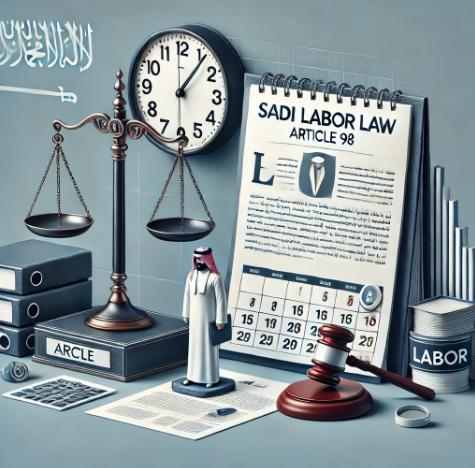The Saudi Labor Law was established to clarify the rights and obligations of employees and employers. Article 98 of the Saudi Labor Law specifically outlines the number of daily and weekly working hours for employees during regular times and the month of Ramadan. Given the importance of this article and its role in protecting the weaker party in the contractual relationship—the employee—we will explain and interpret the text of this article.
In this discussion, we will cover all details related to the required working hours for employees, whether based on daily or weekly standards. Additionally, we will highlight how this article organizes working hours during Ramadan. We will also identify the cases where an employer is exempted from adhering to the provisions of this article and how employees are compensated for overtime work.
If you are looking for the best labor law attorney, you can rely on Al-Othman Law Firm, as they are fully prepared to assist you.
Article 98 of the Saudi Labor Law
The legislator has taken care to establish the foundations and pillars that regulate work and safeguard the rights of all parties through the issuance of the Labor Law. Article 98 of this system stipulates the following:
“An employee may not be engaged in actual work for more than eight hours a day if the employer adopts the daily standard, or more than forty-eight hours a week if the employer adopts the weekly standard. Actual working hours during the month of Ramadan for Muslims shall be reduced so that they do not exceed six hours a day or thirty-six hours a week.“
This regulation underscores the importance of balancing work demands with the well-being of employees, particularly during the holy month of Ramadan.
Understanding Article 77 of the Saudi Labour Law
Interpretation of Article 98 of the Saudi Labor Law
Article 98 emphasizes the legislator’s commitment to ensuring workers’ comfort and preserving their rights by limiting working hours. Prolonged working hours can lead to fatigue and exhaustion, which this article seeks to prevent. The main points outlined in this article include:
- Daily Standard:
If the employer adopts the daily standard for calculating working hours, the employee cannot be required to work more than 8 hours per day. - Weekly Standard:
If the employer adopts the weekly standard, the employee cannot be required to work more than 48 hours per week. - Reduced Hours During Ramadan:
For Muslims, working hours during the holy month of Ramadan are reduced to 6 hours per day or 36 hours per week.
Exceptions to Article 98
In certain situations, employers are allowed to exceed the limits stipulated in this article, provided specific conditions are met:
- Annual Inventory, Budget Preparation, and Seasonal Readiness:
- Includes activities like annual stock-taking, preparing financial statements, liquidation, account closing, or seasonal preparations (e.g., sales or peak seasons).
- This exception is valid for a maximum of 30 days per year.
- Preventing Accidents or Mitigating Losses:
- Includes work required to prevent a dangerous accident, repair damages, or avoid significant losses, especially for perishable goods.
- Responding to Unusual Workload Pressures:
- Applies when there is an exceptional increase in workload.
- Holidays, Seasons, and Other Minister-Defined Occasions:
- Includes work during holidays, festive occasions, and other seasonal activities specified by ministerial decisions.
Maximum Working Hours in Exceptional Cases
- In all the above cases, actual working hours must not exceed 10 hours per day or 60 hours per week.
- The Minister of Labor determines the maximum allowable overtime hours per year, as specified in Article 106 of the Saudi Labor Law.
These provisions strike a balance between protecting workers’ rights and allowing flexibility for employers to meet operational needs in extraordinary circumstances.
Understanding Saudi Labor Law Article 80: A Comprehensive Guide
Cases Excluded from the Provisions of Article 98 of the Saudi Labor Law
Certain categories of work and workers are not subject to the working hour limitations outlined in Article 98. These exceptions include:
- High-Level Managerial Positions:
- Individuals in senior roles with significant administrative or leadership responsibilities, especially those with authority similar to that of the employer over employees.
- Preparatory or Concluding Work:
- Tasks that must be performed either before the commencement of work or after its completion.
- Intermittent Work:
- Jobs that are necessarily intermittent in nature.
- Guarding and Cleaning Personnel:
- Workers assigned to guarding and cleaning tasks, with the exception of civil security guards.
Saudi Labor Law Resignation: A Comprehensive Guide
Additional Provisions Related to Working Hours in Saudi Labor Law
The legislator has taken care to regulate working hours through several legal provisions, which can be summarized as follows:
1. Adjusting Working Hours (Article 99)
- Extension of Hours:
Working hours may be extended to 9 hours per day for certain categories of workers or in industries where continuous work is not required. - Reduction of Hours:
Working hours may be reduced to 7 hours per day for certain categories of workers or in hazardous or harmful industries. - Ministerial Decision:
Specific categories and industries for these adjustments are determined by a decision from the Minister of Labor.
2. Overtime Compensation (Article 107)
- Additional Pay for Overtime:
Employers must pay workers an additional wage for overtime, equal to the regular hourly rate plus 50% of the basic wage. - Holiday and Vacation Work:
All hours worked during holidays and official vacations are considered overtime.
3. Alternating Work Shifts (Article 100)
- Extended Hours for Shift Work:
In establishments requiring alternating shifts, working hours may exceed 8 hours per day or 48 hours per week, provided:- Ministry approval is obtained.
- The average working hours calculated over a maximum period of 3 weeks do not exceed 8 hours per day or 48 hours per week.
4. Breaks and Rest Periods (Article 101)
- Continuous Work Limitations:
No employee may work for more than 5 consecutive hours without a break for rest, prayer, and meals. Each break must be at least 30 minutes. - Daily Limit:
Employees must not remain at the workplace for more than 11 hours per day.
5. Exclusion of Breaks from Actual Working Hours (Article 102)
- Uncounted Break Periods:
Rest, prayer, and meal breaks are not included in actual working hours. - Freedom During Breaks:
During these breaks, employees are not under the authority of the employer, and the employer cannot require them to remain at the workplace.








